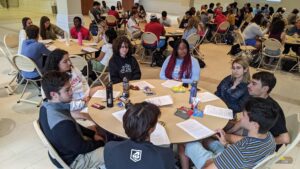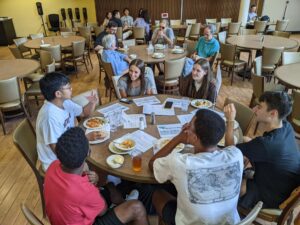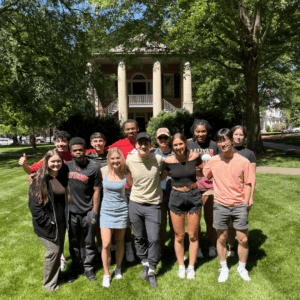Anthony Toumazatos ’25 is a political science major who plans to pursue a career in law. When that time comes, he’ll take with him countless skills gained at Davidson College and an interest in effecting positive change.
The one thing he says will probably help him more than anything? The ability to listen and engage with others, skills he honed directly through his experience as a Deliberative Citizenship Initiative (DCI) Fellow.

DCI Fellows, including Anthony Toumazatos ’25 (front right in black T-shirt), facilitate discussions among Davidson’s Bonner Scholars at a deliberative forum on free speech and inclusion.
“One of the main goals of conversation, and also of life, is to learn from and be exposed to different opinions, experiences and perspectives,” he said. “That’s what the DCI is all about. Everyone has a voice we want to be showcased.”
The DCI launched in 2020 and has created opportunities for Davidson students, faculty, staff, alums and members of the wider community to productively engage with one another on difficult and contentious issues facing our community and society. As program leaders and participants look ahead to growing the impact and scope of the DCI, two recent gifts will help make these opportunities more accessible and widespread.
The DCI has drawn the interest of alums and organizations alike. Amy Harris Wacaster ’98 and her husband, Steven, and the Arthur Vining Davis Foundations (AVDF), are generously supporting the program and its future work.
“Davidson is demonstrating leadership with this program at a time when our public discourse has become far too polarized,” Wacaster said. “We are proud to support the college’s efforts to promote open mindedness, respect and empathy through an initiative that is wholly consistent with Davidson’s core values.”
“The skills that enable constructive conversations across lines of difference are painfully absent and urgently needed,” said AVDF President and CEO Michael Murray. “Institutions of higher learning, like Davidson, are playing a critical role in preparing students, the leaders of tomorrow, to acquire these very skills. As AVDF works to invest in our common future, we are proud to support the Deliberative Citizenship Initiative, which will drive important cultural change on campus and beyond.”
Listening and Learning
DCI participants and partners have been struck by the impact and immediate applicability of their experiences and look forward to doing more.
“Given today’s political environment, I can almost think of nothing more important than this,” said David Barnard ’79. “It’s about developing the skills to have informed conversations in respectful, thoughtful ways.”
Barnard has participated in three DCI small-group discussion groups, called “D Teams,” which meet three times each semester either virtually or in-person. The topics they discuss are hard ones: guns, abortion, immigration, college admission practices, among others. Ahead of each meeting, everyone receives information from several sources that provide basic background information and outline arguments from multiple perspectives on the issue. These materials help participants, who include Davidson students, faculty, staff, alumni and community members, come into the conversation a little more informed about the topic at hand.
“I have never heard anyone be disrespectful in any session, so it’s a great place to practice these skills of listening and understanding,” he said. “I truly have learned how to be a better listener. Today, when I hear ideas different from my own, I slow down and assume there is probably truth to what they’re saying. It is a phenomenal gift this program has given me.”
Town of Davidson community member Pam Dykstra agrees. In addition to being a D Team participant, she is a member of the DCI Advisory Council. She also has joined and helped organize several deliberative events at Davidson College Presbyterian Church that have adopted the DCI’s approach.
“The politics in the United States are incredibly divisive because few people talk to each other,” she said. “I don’t know of another vehicle where I get both sides of an issue, objectively covered. DCI does it.”
Dykstra described how she was overwhelmed in the best way by her first D Team experience. Going in, she was certain of how she felt about her group’s topic, fair elections, and was surprised to learn so much more.
“One thing I love is that you have learned so much before you even start the conversation, because the information you receive in advance is excellent,” she said. “And then, you start to understand why the other side thinks the way they do, that there is a reason for their arguments,” she said. “You get to see people as human beings, which is something I think we’ve forgotten how to do.”
Following the similarly structured conversations at her church, which explore faith-based topics and are guided by facilitators trained by the DCI, Dykstra has received excellent feedback. Attendees have said they felt more confident going home for the holidays and spending time with family members with differing opinions on important topics. One person said they knew they disagreed with others but they were always hesitant to bring it up. As a result of the DCI’s work, they now have the tools to tackle those conversations.
On-Campus Impact
The usefulness of DCI is not limited to small-group discussions. Jayme Sponsel is the assistant director for research, learning & outreach in Davidson’s E.H. Little Library. Her excitement for DCI started as a D Team participant and has grown into roles on the Advisory Council and, most recently, as a co-convener of the program.
“I was a philosophy major at St. Olaf College in Minnesota, which is a small liberal arts college like Davidson,” she said. “I liked the way we would read something and work to understand and take a critical look at strengths and weaknesses. I think that background led to my excitement about DCI, which gives people the space to talk about personal experiences and how it informs their thinking but also has mechanisms that help us step back and take an objective view without succumbing to personal bias.”
Outside of Sponsel’s personal involvement, the library has partnered with DCI to produce additional campus resources. One such resource, Refresh Your Feed, encourages people to engage with opposing viewpoints, take a close look at their media sources, and evaluate information well. Are you only following people who think the way you think? Do you only read content from news sources you assume are on “your side” of certain topics? Even after people participate in D Teams, Sponsel believes it is important to continue researching different perspectives.

Students meet as part of DCI conversations in Vail Commons
“There’s always a risk that you’re going to fall back into an echo chamber and engage in dialogues that represent one viewpoint,” Sponsel said. “We want to encourage people to break out of that habit and make it a practice to continue learning.”
In the classroom, Davidson faculty members have long strived to promote courageous conversations and respectful debate. DCI practices have supported that work for professors like Melissa González, who also serves as the college’s interim chief equity and inclusion officer. In her “Intro to Gender & Sexuality Studies” course, González saw the impact of deliberative practices.
“I thought about how the broader definition of citizenship deployed by the DCI, alongside its focus on engagement with public life, was largely compatible with the forms of activism we study and analyze in [this course],” she wrote in a DCI blog post last year. “Workshopping and peer-reviewing the Deliberation Guide required [students] to collaborate intellectually across their differences, as did many mini-deliberations in class. Repeatedly, students observed that they were encountering previously unknown perspectives on different aspects of the human experience, which is expected in this course, and they engaged these with curiosity and respect for difference.”
Gonzalez is one of 21 faculty members (15 from Davidson and 6 from other colleges) who have developed deliberation-involved courses as part of the DCI’s Deliberative Pedagogy (DeeP) Collaborative and Deliberation Across the Curriculum Program. Many of these faculty members have also participated in the DCI’s Deliberation Facilitator Training Program and Deliberative Citizenship Speaker Series, which have also been attended by Davidson staff, alums, community members, and the DCI’s Fellows. The diversity of participants who have joined DCI programs is impressive—people with a wide range of backgrounds and viewpoints have been attracted to the opportunity to explore difficult issues together.
Looking ahead, DCI Faculty Director and Political Science Professor Graham Bullock is excited about the potential to engage even more people from different backgrounds. The generous support from the Wacaster family and the Arthur Vining Davis Foundations will enable the DCI to significantly grow its existing programs—the Fellows Program, D Teams, Deliberative Forums, DeeP Collaborative, Speaker Series, and Training Program—while creating new opportunities to engage in conversations about contentious topics.
“This past year, nearly a thousand people participated in the DCI’s programs (over 300 in our D Teams alone), and we look forward to now being able to welcome even more people to the discussions we’re hosting,” he said. “We’ll be expanding our current programs, organizing new specialized workshops for even more faculty, and developing deliberation opportunities customized for first-year students, for example. We’re deeply grateful to the Wacasters and the Arthur Vining Davis Foundations, as they have made this a truly exciting time for the DCI.
The expansion could not come at a better time.
“By emphasizing particular deliberative skills and dispositions, the discussions that the DCI hosts encourage participants to both truly listen to one another and clearly articulate the reasons—the life experiences, emotions, evidence, and arguments—that animate their own positions,” Bullock said. “In this way, they have the opportunity to not only discover and better understand their areas of agreement and disagreement but also their common concerns and common humanity. This shared understanding can then help catalyze creative solutions to those concerns and the challenges facing our society.”

Some of the 2022-23 cohort of DCI Fellows on campus between Eu and Phi Halls
Toumazatos—one of the 32 Davidson students who have served as DCI Fellows thus far—will continue putting his own DCI experiences and new skills to good use in the classroom and across campus.
“We can’t afford to ignore the issues in our world,” he said. “Once we leave Davidson, we will have to grapple with all kinds of topics as citizens of the United States or whatever country we live in. So we might as well talk about it now.”
For more information see here.
Back to all Stories
